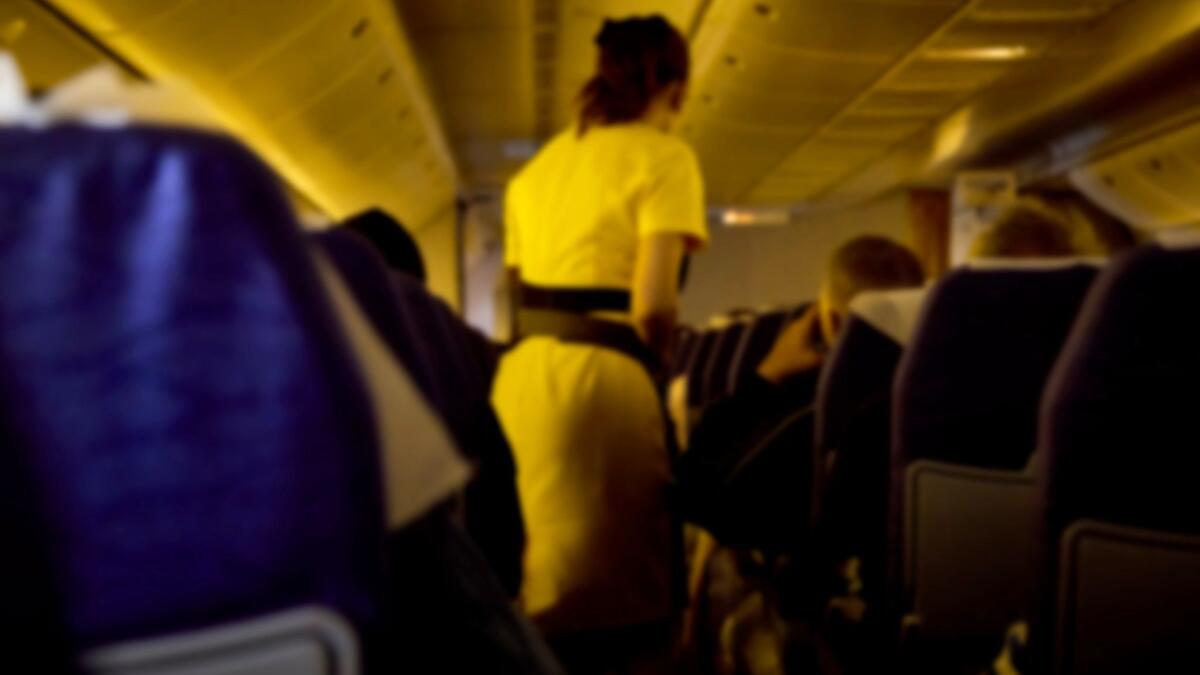Passengers aren’t the only ones who suffer sexual abuse. So do flight attendants

- Share via
For 115,000 flight attendants working for U.S. airlines — and I am one of them — passenger safety is a top priority and the point of our job. We are trained to react to emergency situations.
But nowadays it’s not just problems with the plane or turbulent weather. It’s sexual misconduct.
I recently wrote about in-flight sexual assaults among airline passengers. In one case, a 13-year-old girl was assaulted by a 26-year-old man. He was convicted and has since been released from prison.
To this list of victims we also must add flight attendants. Two JetBlue flight attendants recently sued the airline in federal court, saying they had been drugged and raped by two of the airline’s pilots.
Recently, another, more pervasive peril has come into sharper focus, thanks to a report by a flight attendants union. Women constitute nearly 80% of U.S. flight attendants, and more than two-thirds of them have been sexually harassed during their careers, according to a recent survey by the Assn. of Flight Attendants-CWA, the nation’s largest flight attendants union, representing 50,000 members at 20 airlines.
When asked whether they had suffered verbal sexual abuse during the previous year, 35% of respondents said yes. Of those, a third endured verbal harassment of a sexual nature five or more times that year. The abuses came in the form of passenger remarks that were deemed “nasty, unwanted, lewd, crude, inappropriate, uncomfortable, sexual, suggestive and dirty.”
During the same one-year period, 18% of female flight attendants said a passenger had sexually assaulted them. Forty percent of these victims experienced three or more incidents that year. The assaults were defined as having “their breast, buttocks and crotch area touched, felt, pulled, grabbed, groped, slapped, rubbed and fondled.”
Why these issues weren’t addressed before is partly the result of underreporting, said Taylor Garland, a representative for the flight attendants’ union. Some flight attendants simply didn’t think they would be believed. Passenger incidents involving flight attendants also fell into an “other” category on reports and were not classified as harassment.
Whether the victim is a passenger or flight attendant, air travel poses two unique challenges. If it’s a law enforcement matter, you can’t call 911 at 30,000 feet.
The other issue: Most flight attendants have not been trained in how to handle sexual harassment and assault allegations, their own or a passenger’s. We’re trained in conflict-resolution. But once we separate a victimized passenger from a suspect, we’re left to our own devices as to which questions to ask and what steps to take.
The double whammy of a flight attendant issue: When a female flight attendant becomes the victim, she’s responsible for passenger safety on the flight and yet finds herself in jeopardy.
Take this issue. It’s an older example, but one that was close to me because the flight attendant and I had dated.
She was working for a major airline. On this particular flight, she bent over to grab a can of soda. A male passenger reached into the aisle and slapped her on the buttocks. She whirled around and punched him, full throttle, in the face.
I applauded her response. The airline did not.
After management reviewed the incident report, they decided her response was excessive. Faced with losing her job, she contacted a union representative.
Ultimately, what saved her was a letter from her abuser. Appalled by his own drunken behavior on the flight, he asked her for forgiveness, accepted 100% of the blame and asked the airline to absolve her of any wrongdoing.
Thanks in part to the #MeToo movement, we have come a long way since the days when a man can do something this egregious in front of a planeload of witnesses and get away with it. If the AFA survey is any indication, however, more needs to be done.
In March 2018, Congress directed the Department of Transportation to create an In-Flight Sexual Assault Task Force. A major component of the directive includes “initial and annual recurrent training for flight attendants, pilots and other individuals who are employees or contractors of the air carrier that respond to or address sexual assault and sexual harassment of passengers, employees and contractors of the air carrier onboard commercial aircraft.”
In response, airlines are beginning to put training, which is not mandated by federal law, into place.
The airline I work for recently created a 30-minute online training program that shows employees how to recognize and document incidents of sexual harassment. Using workplace scenarios, the mandatory course encourages victims to confront abusers, collect witness statements and report allegations to a supervisor.
All employees are required to complete the program by July 1.
All of us — passengers and crew — must continue to be vigilant as we redefine what it means to keep everyone safe.
More to Read
Sign up for The Wild
We’ll help you find the best places to hike, bike and run, as well as the perfect silent spots for meditation and yoga.
You may occasionally receive promotional content from the Los Angeles Times.






